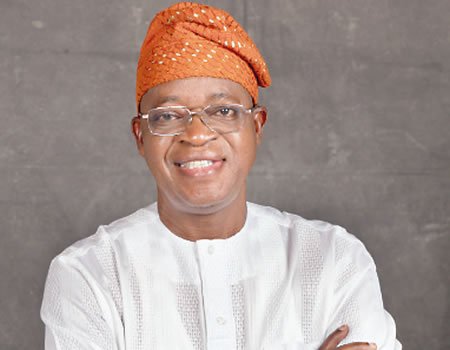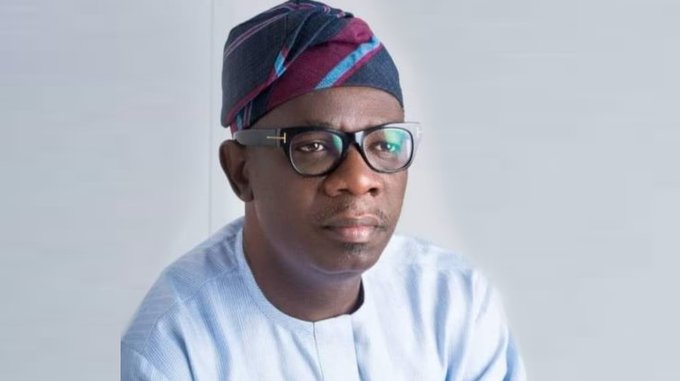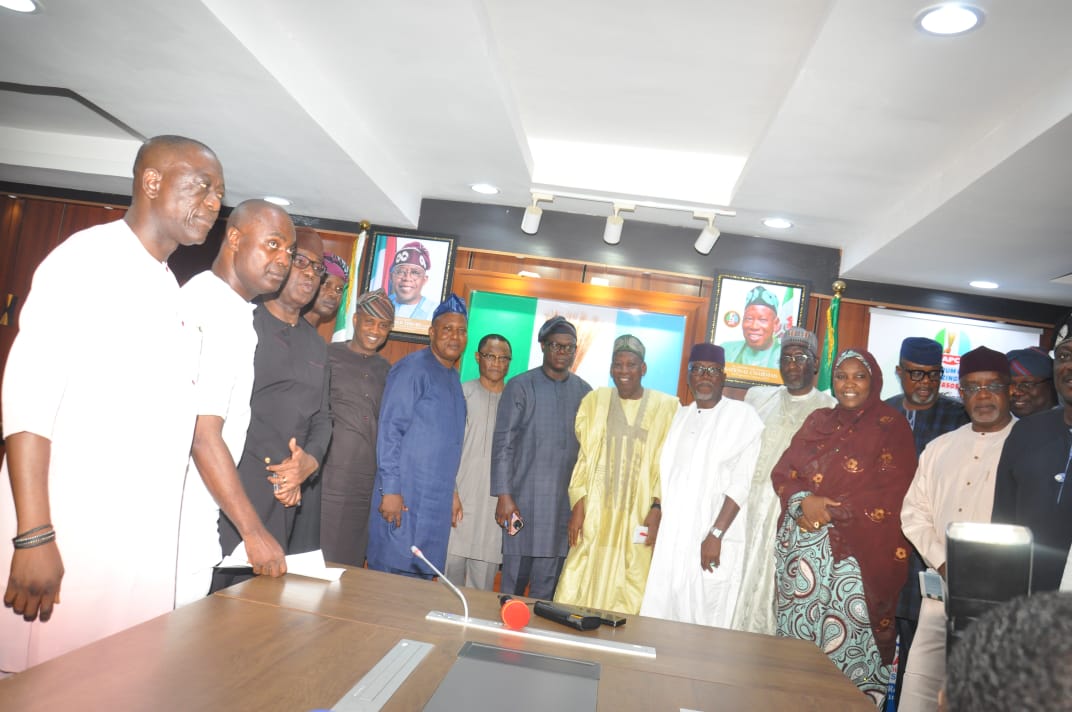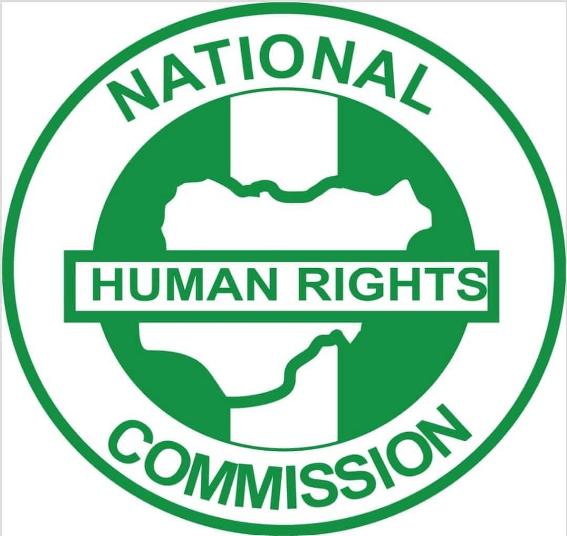Oyetola Preaches Peaceful Voting At Valentine Season


Do you wonder why our general elections are conducted during the Valentine’s season, a rare season when love to others must be openly celebrated? Do you know that our Governor, Mr Adegboyega Oyetolais an apostle of peace and love to every person in the State without the least appeal to the worst in opposition parties? Do you know that adequate security of life and property has been guaranteed by security agencies in our State for this season of love and choice as we vote and celebrate Valentine’s love on election day? Do you know that no election is worth any human blood? What is ‘Valentine’s love’? You care to know? Enjoy this time-out.
Hurray! February 14 is here with us. It is a day that we celebrate unconditional love not just for ourselves but love for those opposed to us. Can you love your enemies, even at the point of death? Do you know that was what the various Valentines did that made us to celebrate them till today? Do you know that numerous early Christian martyrs were named Valentine? Do you know that the Valentines we honour yearly on February 14 are Valentine of Rome and Valentine of Terni? Who were they and what did they do? Enjoy this time-out, please.
Are you aware that Valentine of Rome was a Catholic priest in Rome, arrested, tortured and summarily killed for his faith by Emperor Claudius II? Do you know that during this ordeal, he was personally interrogated by the Emperor to intimidate him to submission to renounce his faith? Do you know that he stood his ground and nearly converted the Emperor himself in his preachments? Alas! Valentine of Rome was condemned for heresy, an infraction punishable by death. Do you know that after being condemned to death, Valentine of Rome still fasted and prayed for Julia, the ailing daughter of his tormentor and the girl’s health was restored miraculously? Can you pray and heal your enemy or his ailing child at the point of death? That was what Valentine of Rome did. Valentine of Rome was summarily executed for his pious religious belief in 269 AD and this rare attribute inspired Pope Galesius in 496 AD to declare him a Saint and a celebrity.
And now another Valentine. This one was named Valentine of Terni. He served as a Catholic Bishop of Interamna. He invested love and charity in all ways in every person that came his way. He was arrested for his good deeds and faith. He was tried, tortured andsummarily executed in 273 AD during the reign of Emperor Aurelian. February 14 is dedicated to celebrate these rare breed of men who once traversed our world. Do you now see that the day is about love, piety and sacrifice? Trust us! Now, we celebrate the day with wild romance lazed with mercantile inclinations and questionable sit-outs in blue and red joints. Yeah! Love is love! Jah loves you! No stress! Can you quip as to why our general elections are fixed to coincide with this season of love, piety and sacrifice?
Do you take time to peep into our court room at this season? Don’t you see Onnoghe’s fever renting the air? Did you see law countering law, arguments countering arguments, and smokes of vision and revision rocking the diplomatic circles on the propriety or otherwise of Onnoghe’s fever….all in the spirit of the season? Do you see bunches of brooms, posters, music, colours, dances and campaigns renting the air shouting:”SayBaba”?
Did you see the chartered helicopter of our Vice President crashing on a dusty field and after being divinely rescued from the near-death crash, the frenzy of campaigns still proceeded without the least appeal to postpone the rally? What other love for our country is greater than this? Some Valentines are already with us, not necessarily in the Catholic cassocks but in the political regalia of the All Progressive Congress. Truly, the flight to the next level is air-borne.
And one more side attraction! Did you see the podia crashing in ‘disatikulating‘ ways without the massive umbrellas rescuing any sinking person from the great fall? This season is telling us stories… stories of passion for service, resilience and love for our nation across all political divides. The season of love is here. If you listen carefully, you will hear. Are you aware that an election is a decision-making process to choose an individual to hold public office? Do you know that elections were used in ancient Greece and Rome to select rulers particularly, the Popes? Do you know that this type of election had been the usual mechanism by which modern representative democracy has operated since the 17th century? Do you know that one fundamental issue causing misunderstanding in election is the issue of suffrage? Come along, please.
Do you have landed property? Do you know that the eligibility to vote in an election called suffrage was once determined by sex and ownership of landed property in Britain at a time? Do you know that it was by 1920 all Western European and North American democracies had universal adult male suffrage (except Switzerland) and many countries began to consider women’s suffrage later? Do you know that all jurisdictions require a minimum age for voting? Could you believe that Aboriginal people in Australia, the real natives of Australia, were not given the right to vote until 1962 in their own land? Do you know that in 2010 the Federal Government of Australia removed the rights of prisoners serving for 3 years or more to vote? Do you know that in some jurisdictions, voting is required by law and that if an eligible voter does not cast a vote, he or she may be fined $20 as a first time offender? Do you know that each country has its own electoral systems? A time-out.
Are you aware that the objective of an electoral system is to convert the vote into a political decision? Do you know election scheduling is simply to granulate that elections are held at fixed regular intervals? Do you know that election campaigns make politicians to compete directly for votes? Do you know that in all jurisdictions, elections are trailed with certain difficulties in terms of being free, fair and credible? Do you know that there must not be undue interference with elections through physical force, verbal intimidation, or fraud, which can result in improper casting or counting of votes? Do you know that there must be open political debates, freedom of the press, fair election guidelines and rule of law rather than coercion for elections to pass the repugnancy test of fairness?
Hurray! The general elections in Nigeria are here with us to elect representatives to the Nigerian federal government and the various States in Nigeria. General elections will be held in Nigeria on 16 February, 2019to elect the President and the National Assembly. This will be the sixth quadrennial elections since the end of military rule in May, 1999. Are you aware that the President of Nigeria is elected using a simple majority of the highest votes cast, as well as over 25% of the votes in at least two-thirds of States of the Federation? Do you know that the 360 House of Representatives members are elected on Federal constituency basis? Do you know that the 109 Senators are elected from the three Senatorial Districts into which each States is divided? Do you know that all of us have responsibilities to protect the sanctity of these general elections by promoting peace and shun political violence? What amounts to political violence? Enjoy this time-out.
Do you know that any violence perpetrated by people to achieve political goals is qualified as political violence? Do you know that political violence can be perpetrated by State Actors such as the security agencies and non-State Actors, including the people and the non-governmental organisations? Do you know that there are some people in our midst that hold the belief that their political systems will never respond to their demands and thus believe that violence is not only justified but also necessary in order to achieve their political objectives? Do you know that in some jurisdictions, some authorities believe they need to use violence in order to intimidate their populace into acquiescence? The apostles of Nicollo Machiavelli himself?
Do you know that there are types of political violence? Do you know that common fight among the non-state actors is enough political violence? Do you know that all acts of terror are enough political violence? Do you know that genocide is one form of political violence? Do you know that torture is a human rights violation and is declared unacceptable by Article 5 of the UN Declaration of Human Rights? Are you aware that signatories of the Third Geneva Convention and Fourth Geneva Convention have officially agreed not to torture prisoners even, in armed conflicts? Do you know that organizations such as Amnesty International and the International Rehabilitation Council for Torture Victims monitor abuses of human rights and reports widespread violations of human torture by States in many regions of the world? Do you know that Amnesty International estimates that at least 81 countries currently practice torture, some of them openly?
Do you know that political violence includes any extrajudicial killing, which is the killing of a person by governmental authorities without the sanction of any judicial proceeding? Are you aware that in 2007 the UN General Assembly passed the UN moratorium on the death penalty which called for worldwide abolition of the death penalty? Do you know that any police brutality is another form of political violence and a civil rights violation? Do you know that famine may be a political weapon? Do you know that rioting is a political violence? Do you know that war is politics by other name and it carries strict liability? Do you know that there were more than 60 million lives that were lost in the Second World War? Do you know that in 2014, 126,059 people were estimated to have died in 40 armed conflicts active in 27 locations in the world? Do you know that out of the 40 conflicts, 11 have been classified at the level of war, which means that there were at least 1,000 deaths in one calendar year from each of the theatres of war? Do you know that certain theories have been propounded to explain political violence? You care for them? Enjoy this time-out.
Do you know that theories of political violence can be interpreted in macro and micro spectra? Do you know that Micro theories discuss political violence processes as involving individuals and households in terms of who participates in violence and what motivates people to participate? Are you aware that the macro theory of political violence is composed of some other theories to explain political violence? The Macro theory of political violence is made up of Social Conflict theory, War’s Inefficiency Puzzle, Functionalist theory, Mass Society theory, Resource Mobilization theory, Primordalist theory, Instrumentalist theory, Constructivist theory and Youth Bulge theories.
Do you know that the social conflict theory is a Marxist-based social theory which states that social systems reflect the vested interests of those who own and control resources and this causes the rest of society to become alienated or psychologically separated from the people in power? Do you know that the theory justifies violence as the consequence against this alienation? Do you know that the war’s inefficiency puzzle believes that States prefer to bargain instead of going to war and that if the bargain fails, the use of violence may result? The functionalist sees society as an organism whose entire system has to be in good working order for systemic equilibrium to be maintained and that when there is an unexpected shock to the system, society becomes disorientated and allow for collective violence. The mass society theory argues that violent social movements come from people who are isolated socially and from political institutions and that people who are alienated are easily convinced to join radical or extremist movements.
Do you know that the resource mobilization theory emphasizes the capacity of competing groups to organize and use adequate resources to achieve their goals? Do you know that the resources can be time, money, organizational skills, and certain social or political opportunities and that political violence occurs when individuals are able to mobilize sufficient resources to take action? Do you know that primordialism explains ethnic violence and ethnic conflict in terms of inter-ethnic differences, race, language, religious, regional characteristics, and other visible negative markers? Do you know that the Instrumentalist believes that conflict occurs when leaders manipulate ethnicity for the sake of political power or economic gain? Do you know that Youth bulge theory believes that the rise in youth population creates challenges of employment and high crime wave?
The rational choice theory of political violence believes that political violence occurs when the benefits in participating in political violence outweighs the costs. Do you know that the relative deprivation theory believes that relative deprivation creates gap between the wants and needs which will lead to collective discontent which leads people to resort to violence.? Do you know that the collective action theory explains that a person decides to participate or not participate in a rebellion based on the benefits and costs? Do you know that the conflict between greed against grievance states that individuals are motivated by grievance when they fight over high inequality, a lack of political rights or ethnic and religious divisions in society? Do you know that the consequences of political violence are fatal politically, socially, religiously and culturally and must be seen as a whirlwind that blows no one any good? Do you know that different countries have divergent strategies to reduce political violence? Have you heard of the Bangladesh Model? Come along, please,
Elections in Bangladesh, a country sharing borders with India had always been synonymous with war. Between 1994 and 1996,there were protests for a special election- time neutral care-taker government that will make all candidates to compete on a level playground. No candidate will have access to presidential jets for campaigns. No candidate will have power to suspend the Chief Justice of the Federation. It was to discourage the ‘hallow effects’ of‘incumbency factors’. This was to forestall incumbent government having access to the public resources against other contestants.
After the 1994-96 protest, Bangladesh amended the Constitution to include caretaker government system that will oversee the election. This is the Bangladesh Model. Hurray! Successive caretaker governments in Bangladesh conducted free, fair and credible national elections in 1996, 2001 and 2008. Alas! In 2011, the government in Bangladesh led by Awami League scrapped the provision of election-time caretaker government following a much debated verdict by the Supreme Court of the country that declared the caretaker government system illegal creating a political crisis in the country. Later, the 2014 general election was held under the supervision of Awami League government and was boycotted by 30 of 42 registered political parties of the country, resulting in the deterioration of the political situation further. On 30 December, 2018 Bangladesh became enough bad news to the world as a result of election violence.
Do you know that the Kenyan Presidential Election crisis which followed the presidential election that was held on 27 December 2007 landed some personalities in prosecution at the International Criminal Court? Do you know that a series of protests and demonstrations led to many deaths, injuries and displacements? Do you know that an estimated 1,200 people died and more than 500,000 were displaced from their homes? Do you know that after failed attempts to conduct a criminal investigation of the key perpetrators in Kenya, the matter was referred to the International Criminal Court in The Hague? Do you know that in 2010, the Prosecutor of the ICC Luis Moreno Ocampoannounced that he was seeking summonses for six people: Deputy Prime Minister Uhuru Kenyatta, Industrialisation Minister Henry Kosgey, Education Minister William Ruto, Cabinet Secretary Francis Muthaura, radio executive Joshua Arap Sang and former police commissioner Mohammed Hussein Ali—all accused of crimes against humanity?
Do you know that the six suspects were indicted by the ICC’s Pre-Trial Chamber II on 8 March 2011 and summoned to appear before the Court? Do you know that the Kenyan government appealed to both the United Nations Security Council and the Court itself regarding the admissibility of the case? Do you know that the National Assembly of Kenya voted in favourof removing Kenya as a State party to the Rome Statute, the international treaty which established the ICC? It was such a serious palaver. We must exercise restraints always. It is in a bid to promote free, fair and credible election that election monitoring is promoted across the world. What is election monitoring? Enjoy this time-out.
This is the observation of an election by one or more independent parties, typically from another country or a non-governmental organization, primarily to assess how free, fair and credible an election is on the basis of national legislation and international election standards. Do you know that the first monitored election was that of an 1857 plebiscite in Romania that was monitored by major European powers then? Do you know that there are national and international election observers? Election observation increasingly looks at the entire electoral process over a longer period of time, rather than at election-day proceedings only. Do you know that international election observation is no longer focused only on elections in countries with weak democracies but now spreading to larger democracies, too, including the United States, France, the United Kingdom and Switzerland? Do you know that popular organisations monitoring elections include: Organization of American States, the Organization for Security and Co-operation in Europe (OSCE), the European Union, the Commonwealth Secretariat, the Council of Europe and the African Union. Individual governments also participate in monitoring efforts, generally under the umbrella of an international organization. These national efforts are normally managed by the local electoral commission.
Do you know that a wide array of NGOs also participate in monitoring efforts. The Carter Center, for example, played a key role — with the United Nations Electoral Assistance Division and the National Democratic Institute — in building consensus on a common set of international principles for election observation. International observation is complemented in many countries by domestic observer groups.
Do you know that long term International Election Observers monitor the entire electoral processes? Do you know that these election experts begin their work weeks before the actual election day, looking at candidate registration, the legal framework, the media situation, the work of the election administration, and the campaign environment? Do you know that the short-term observers on election day monitor the opening of polling stations, the vote cast, and the counting and tabulation of results. Do you know that after election day, observers remain in the country for another few weeks to monitor how possible election-related shortcomings and complaints are dealt with by the election administration and the judiciary? Do you know that the findings of the observers are made public in reports issued after election day?
Do you know that Domestic Election Observers are given the opportunities to monitor elections, too? Election monitoring is to contribute to promoting awareness about the significance of democracy at the local and regional level. Do you know that we now have International Election Monitors Institute? Do you know that the Institute was established in June, 2006, as a joint project of the Canadian Association of Former Parliamentarians, the United States Association of Former Members of Congress, and the European Parliament Former Members Association? Do you know that the Institute manages a dedicated and professional programme to recruit, train, and arrange for the deployment of former parliamentarians from the three organizations? Do you know that the Institute works with governmental and non-governmental partners on post-election democracy-building initiatives in countries where the Institute has observed elections?
Do you know that all of us have to comport ourselves as these election monitors are already in all our communities in the last three months at least? Do you know that in their bid to announce that they are very much around for business, the U.S., UK and EU diplomatic missions simultaneously condemned the suspension of Chief Justice Onnoghen and insinuated that Onnoghen’s suspension could affect the general election and its aftermath? The presidential spokesperson, Garba Shehu kept his powder dry on the issue. In his well-crafted reply, he declared that as much as Nigeria welcomes interests and partnerships for free and fair polls, the government would not condone unfair interference in the country’s internal affairs. Equally, Governor El Rufai on a popular TV programme adivised the monitors not to descend to the ridiculous to take sovereignty from Nigeria in the garb of election monitoring. In a twist of events, the European Union Election Observation Mission insisted in their releases: “We are aware of the comments …..about non-interference by foreigners during a talk show on NigeriaDecides2019 on 5/2/19. The EU only deploys an election observation mission when it is invited to do so by the authorities of a country. The EU has been invited to observe all of the general elections in Nigeria since 1999. Thus this is the sixth time the EU is observing elections in Nigeria. Observation missions are impartial, do not interfere in the electoral process, and operate according to a strict code of conduct. While the security of EU observers is of paramount importance, and will remain under constant review, EU observers will continue their work across the country in the run-up to – and beyond – the 16 February elections. For the last month our team in Abuja, as well as 40 long-term observers across the country, have followed the elections. We’ve met with a wide range of candidates, parties, election officials, security agencies, CSOs and have enjoyed good cooperation at federal and state levels”.
In order to balloon the issue, one opposition party called on the international community to immediately impose a travel ban on that Governor and threatened to pull out of the national peace accord before asking the National Peace committee to summon the State governor over his comments. What a ‘smart’ way to put the cart before the horse! Are you aware that the 2019 peace accord, convened by a former Head of State, General Abdulsalami Abubakar, was to commit the political parties and candidates to a peaceful poll at this Valentine’s season? We must monitor ourselves for compliance with the peace treaty already signed and sealed. As our country goes to the poll on February 16, Governor Oyetola is enjoining us to shun violence. We must radiate the season of love.
Do you know that three months ahead of this 2019general elections, the Independent Electoral Commission (INEC), in collaboration with the African Union (AU), West Africa Network for Peace-building (WANEP), launched the 2019 Election Violence Monitoring, Analysis and Mitigation (EMAM) Project? The project is to mitigate election violence and take proactive actions before things get out of hand. The project involves a real time monitoring, analysis and communication of several risks with periodic debriefing of key stakeholders. The monitors at the community, state and zonal levels report threats and incidents of electoral disputes and violence throughout the electioneering process to the National Election Analysis and Response Center. The centre is providing timely analysed information to critical stakeholders including the national peace actors, security agents, electoral commission and other key institutions of the States, ECOWAS, AU and development partners for rapid response.
It is expected that Nigeria will not fail expectations of international community to lead the African Continent into electoral credibility. The security agents and the judiciary are the strong hopes of the people at this time. The electoral body is having a mandate that we must all see to succeed. Nigerians are urged to go beyond party and parochial interest in the forthcoming elections to enable the nation meet the expectations of providing leadership for the African continent. We installed democracy in Liberia. We installed democracy in Gambia. We installed democracy in Sierra Leone. Now, physician, heal yourself! We must reaffirm our collective commitment and support to the Nigerian government in ensuring the successful conduct of the 2019 general elections. Say No! to violence as we enjoy the collective romance of St Valentine’s Day. This is the sublime charge to us all from our affable Governor Adegboyega Oyetola. Happy Valentines’










